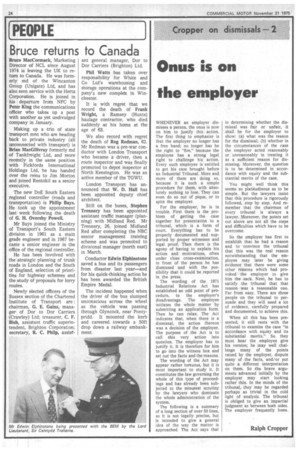Onus is on the employer
Page 26

If you've noticed an error in this article please click here to report it so we can fix it.
WHENEVER an employer dismisses a person, the onus is now on him to justify this action. The first thing to emphasise is that the employer no longer has a free hand; no longer has he the right to "fire," because the employee has a strong legal right to challenge his action. Every such employee is entitled to get his case brought before an Industrial Tribunal. More and more of them are doing so, because it is such a simple procedure for them, with absolutely nothing to lose. They can even do so out of pique, or to spite the employer.
For the employer, he is in trouble. First there is the problem of getting the case together for presentation to a tribunal, which is a form of court. Everything has to be properly documented and supported by proper witnesses and legal proof. Then there is the agony of having to explain his action and motivations, often under close cross-examination, in front of the person •he has dismissed and with the possibility that it could be reported in the press.
The wording of the 1971 Industrial Relations Act has established an odd point of procedure, to the employer's disadvantage. The employee initiates the whole matter by submitting an application form. Then he can relax. The Act indicates that, when there is a dismissal, the action thereon was a decision of the employer. The purpose of the Act is to call this very action into question. The employer has to justify it. It is therefore for him to go into the witness box and set out the facts and the reasons.
The wording of the Act may appear rather tortuous, but it is most important to study it. It constitutes the law governing the whole of this type of proceedings and has already been subjected to the minutest scrutiny by the lawyers who dominate the whole administration of the system.
The following is a summary of a long section of over 50 lines, so it is not legally precise, but is intended to give a general idea of the way the matter is approached, The Act says that
in determining whether the dismissal was fair or unfair, it shall be for the employer to show; (a) what was the reason for the dismissal; (b) whether in the circumstances of the case the employer acted reasonably or unreasonably •in treating it as a sufficient reason for dismissing. Moreover, the question is to be determined in accordance with equity and the substantial merits of the case.
You might well think this seems so platitudinous as to be simple. But the lawyers insist that this procedure is rigorously followed, step by step. And remember that the chairman of every tribunal is always a lawyer. Moreover, the points set out above are not all the steps and difficulties which have to be overcome.
So the employer has first to establish that he had a reason and to convince the tribunal that this was the real reason notwithstanding that the employee may later be giving evidence that there were some other reasons which had provoked the employer to give him the sack. Next, he has to satisfy the tribunal that that reason was a reasonable one. Far from easy. There are three people on the tribunal to persuade and they will need a lot of evidence, carefully prepared and documented, to achieve this.
When all this has been presented, it still rests with the tribunal to examine the case "in accordance with equity and its substantial merits." So they must hear the employee give his version; he may well challenge many of the points raised by •the employer, dispute many of the facts, and/or put quite a different interpretation on them. So the brave arguments advanced initially by the employer may start looking rather thin. In the minds of the tribunal, they may be regarded perhaps as trivial in the cold light of analysis. The tribunal is obliged to give an impartial judgment as between both sides. The employer frequently loses.
Ralph Cropper








































































































